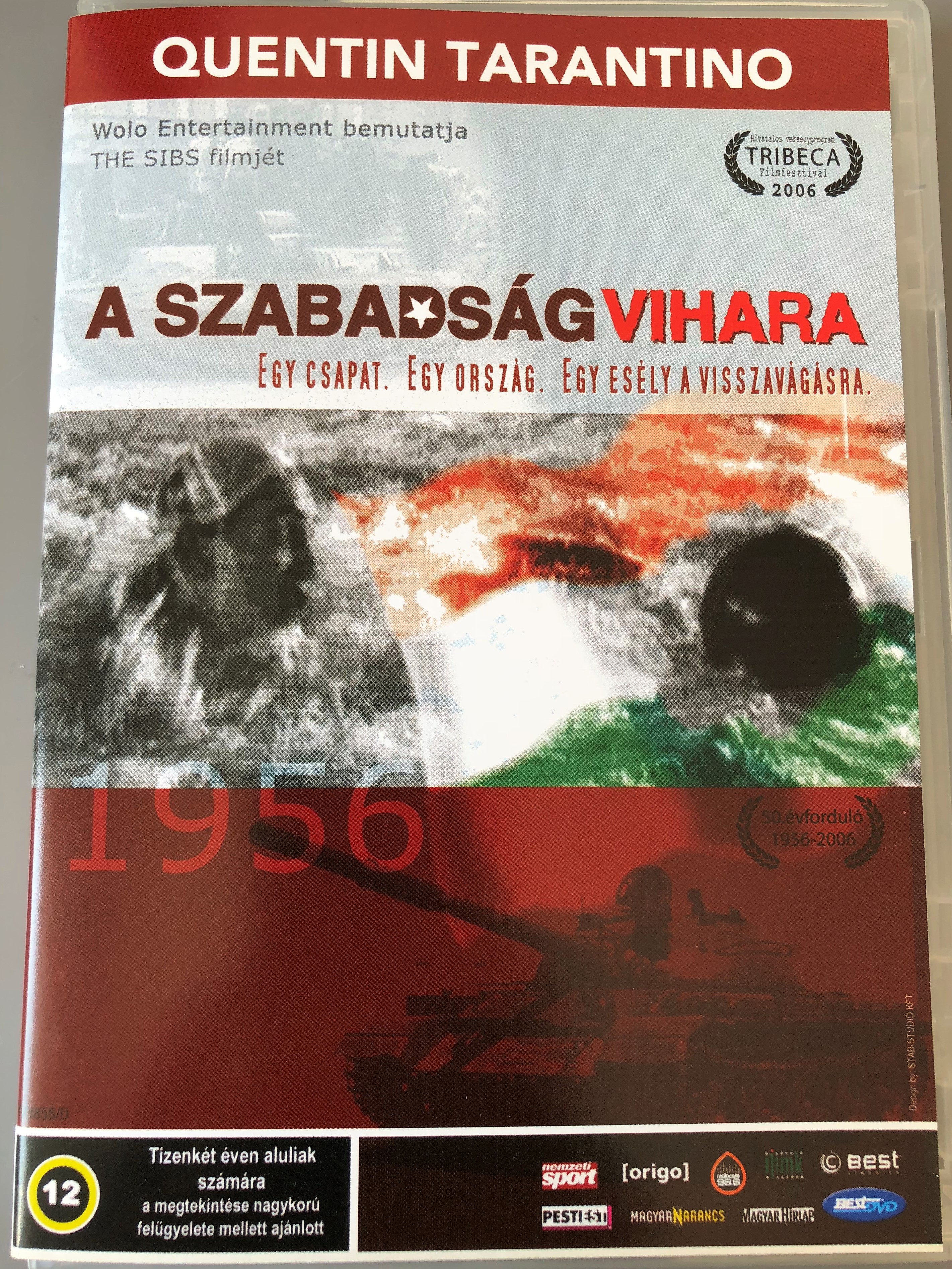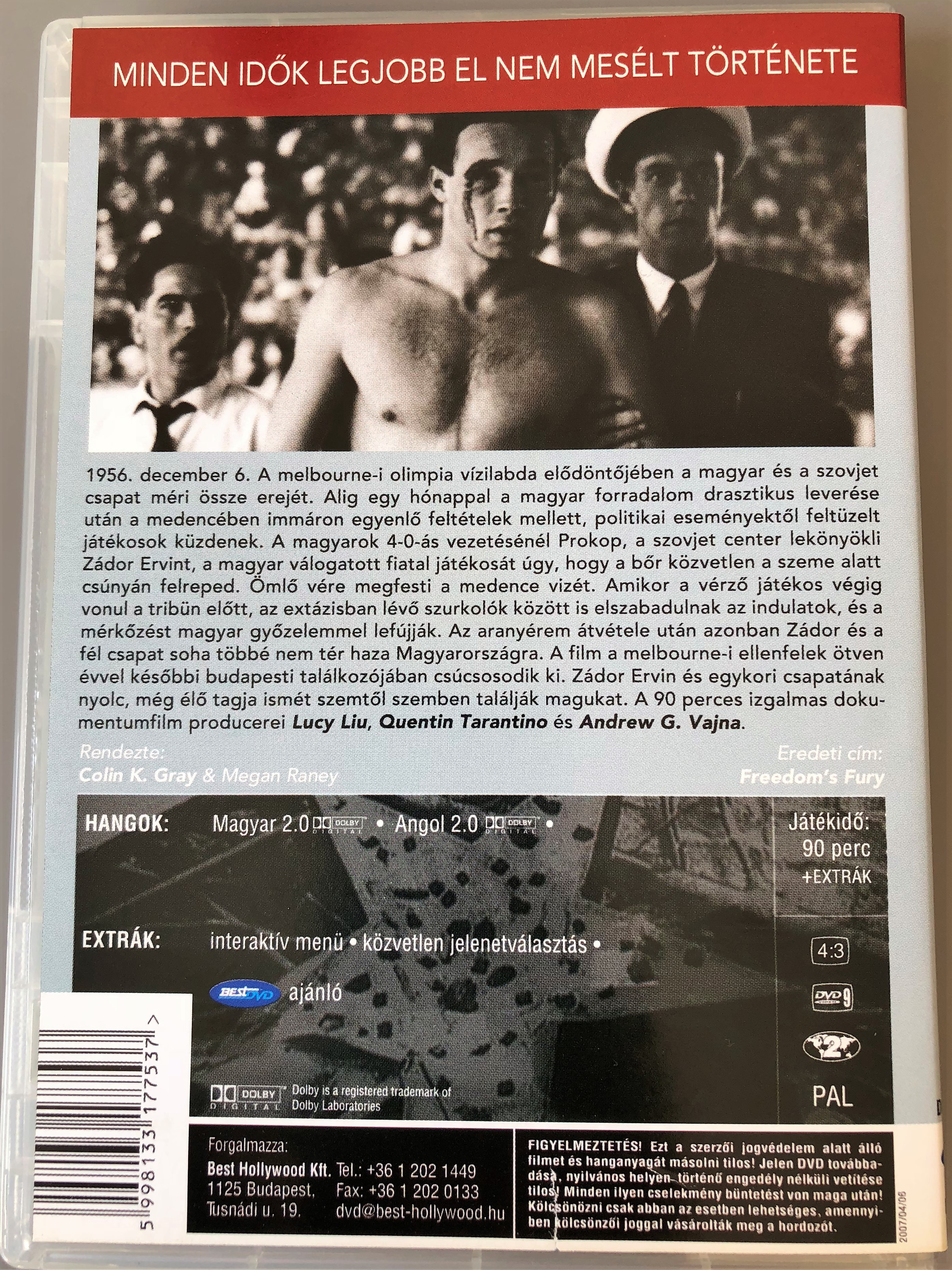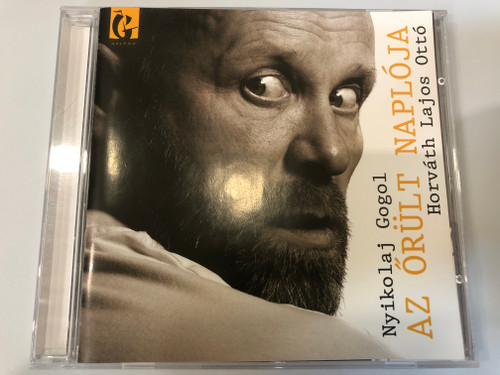Product Overview
A szabadság vihara (2006) Freedom’s Fury / Hungarian vs USSR Water Polo Documentray / ENGLISH and HUNGARIAN Audio / Region 2 PAL / Ahogy az oroszok mondják: vízi póló njet ping pong!
UPC 5998133177537
Freedom's Fury is a documentary film about the Melbourne, Australia 1956 Summer Olympics semifinal water polo match between Hungary and the USSR, and the events that led up to the violent battle, the match that what would later be known as the "Blood in the Water match."
The documentary was narrated by Mark Spitz, who as a teenager had been coached by Ervin Zádor.
The film debuted at the Tribeca Film Festival in 2006, in the year of the 50th anniversary of the match.
This match is considered the most famous match in water polo history.
History
Near the close of World War II in 1945, Hungary was liberated from the Nazis by the forces of the Soviet Union. While there was initial jubilation amongst the people of Hungary, they soon found that they had only exchanged one totalitarian regime for another. As Hungarian educator Karoly Nagy puts it in the film, "yes, we were liberated from one devastating, dictatorial, extremist, horrible creature called Nazis [clears throat], but, during that course, a lot of people were also liberated from all their belongings, they were liberated from their rights, they were liberated from their freedom and life, women were liberated from their honor ..."
By 1956 (the year of the Melbourne Summer Olympics), Hungarian tensions with the satellite government installed by the Soviet Union had risen to the point of mass uprising and, eventually, outright revolution. The film documents the meeting (and subsequent battle) between the representatives of these two rival nations, and in a larger sense, became a globally televised embodiment of the Hungarian people's fight for independence under the communist regime.
Content
The documentary tells the story of the young star of the Hungarian Olympic waterpolo team, Ervin Zador, who finds himself the unwitting focal point of one of the most politicized sports matches ever played, popularly known as the "Blood in the Water" match.
The journey of Zador and the Hungarian waterpolo team to the 1956 Summer Olympics in Melbourne becomes the film's through-line as "Freedom's Fury" explores the larger human tragedy of the Hungarian Revolution of 1956.
As the revolution rages in the city below, the team is on an isolated mountaintop training camp near Budapest, and doesn't learn the details of the savage crushing of the revolt and brutalization of Hungarian citizens by Soviet forces until they land in Melbourne. The animosity they feel towards the Soviet occupiers for the atrocities they committed is transferred to the Soviet players.
After the match, Zador and half his teammates decide to defect rather than return to the oppression in their homeland.
In the final act, the documentary also touches on how the Hungarian Revolution become a symbol of freedom and impacted the collapse of communism in 1989.
Filmmaker commentary
The making of the film allowed for the reconnection of the surviving members of both teams nearly fifty years after the bloody match, this time under very different circumstances. Writer and director Colin Gray said of the men:
Both teams were as much a victim of the circumstances and really both countries were imprisoned by the same ideology - and these guys were able to finally reconnect as human beings and as fellow athletes ... That was something that we really wanted to highlight, the sort of humanistic side to counter the sort of oppression of ideology that everyone had suffered under in the Eastern bloc.[4]
Quentin Tarantino described the film as "the best untold story ever";[5] he also was a co-executive producer with Lucy Liu and Andy Vajna for the film
1956. december 6. A melbourne-i olimpia vízilabda negyeddöntőjében a magyar és a szovjet csapat méri össze erejét. Alig egy hónappal a magyar forradalom drasztikus leverése után a medencében immáron egyenlő feltételek mellett politikai eseményektől feltüzelt játékosok küzdenek.
A magyarok 4-0-ás vezetésénél Prokop, a szovjet center lekönyökli Zádor Ervint a magyar válogatott fiatal játékosát úgy, hogy a bőr közvetlen a szeme alatt csúnyán felreped. Ömlő vére megfesti a medence vizét. Amikor a vérző játékos végig vonul a tribün előtt, az extázisban lévő szurkolók között is elszabadulnak az indulatok, és a mérkőzést magyar győzelemmel lefújják. Az aranyérem átvétele után azonban Zádor és a fél csapat soha többet nem tér haza Magyarországra.
A 90 perces izgalmas dokumentumfilm producerei Lucy Liu, Quentin Tarantino és Andrew G. Vajna. Az alkotók célul tűzték ki, hogy filmjük a fiatal közönség számára is világosan tárja fel az 1956 őszén a szovjet uralom alól fellázadó magyarok történetét, és tették feledhetetlenné a híres-hírhedt, véres vízilabda-mérkőzés párhuzamával.
A film a melbourne-i ellenfelek ötven évvel későbbi budapesti találkozójában csúcsosodik ki. Zádor Ervin és egykori csapatának nyolc, még élő tagja ismét szemtől szemben találják magukat az egykori ádáz vetélytársakkal.
Szereplők:
Gyarmati Dezső, Hevesi István, Zádor Ervin, Martin Miklós, Jeney László, Kárpáti György, Bolvári Antal, Markovits Kálmán.
Rendezők: Colin K. Gray & Megan Raney
Producerek: Lucy Liu, Quentin Tarantino, Andrew G. Vajna, Kristine Lacey
Operatőr: Megan Raney
Gyártó stúdió: Wolo Entertainement
Forgalmazza: Best Hollywood
Playtime / Hossz: 90 perc


| Directed by | Colin Keith Gray [1][2][3] |
|---|---|
| Produced by | Kristine Lacey Thor Halvorssen Quentin Tarantino |
| Written by | Colin Keith Gray [1][2][3] |
| Narrated by | Mark Spitz |
| Music by | Les Hall |
|
Release date
|
2006 |
|
Running time
|
90 min. |
| Language | English, Hungarian |









